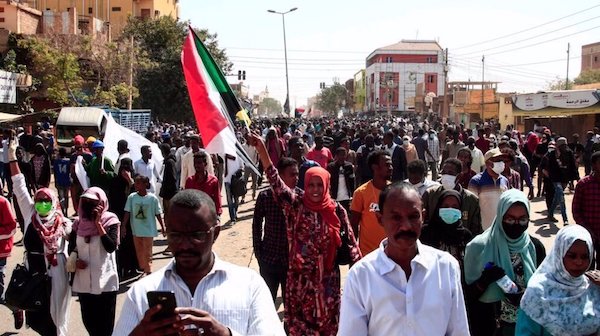
Sudanese demonstrators take part in a rally to protest against the 2021 military coup, in the capital Khartoum, January 30, 2022. (Photo by AFP)
One protester has been killed during an anti-coup rally in Sudan’s capital, Khartoum, when security forces intensified the crackdown using tear gas to disperse demonstrators marching for civilian rule.
On Sunday, the independent Central Committee of Sudanese Doctors (CCSD) said in a statement that 27-year-old Mohamed Yousef Ismail lost his life after suffering a wound to the chest... by coup forces.
The latest death, according to the CCSD, brings to 79 the number of anti-coup protesters killed in the crackdown on anti-junta rallies. More than 2,000 others have been injured since the October 2021 coup. The casualties were mainly caused by gunshots and tear gas canisters.
We go out to demonstrate so that our children can live under a civil, democratic state in the future. We won’t allow our children’s future to be confiscated, a protester said in Khartoum, where thousands of protesters reached within some two kilometers of the presidential palace before security forces stopped their march by firing volleys of tear gas canisters in the early afternoon and started chasing them away.
Blood is the path to freedom, protesters waving the Sudanese flag chanted, as they marched through the streets of Khartoum’s twin city of Omdurman, which lies across the Nile River from the capital. Go back to the barracks, protesters in eastern state of Gedaref shouted at soldiers.
In 2019, massive anti-government demonstrations hit Sudan. The main grievance was about economic woes. The protesters, youths for a large part, demanded resignation of then President Omar al-Bashir, who was ultimately deposed through a military coup in April, after ruling over the country for three decades.
In August the same year, a transitional civilian-military administration was founded to run the country.
However, Sudan’s military chief and de facto leader Abdel Fattah al-Burhan staged a coup on October 25, 2021, and dissolved the fragile government and Abdalla Hamdok, the then prime minister, was detained and put under house arrest. The military takeover infuriated the Sudanese and sparked international outcry, including from the UN Security Council. Other civilian leaders were also held in military detention.
Hamdok was later released and on November 21 signed a power-sharing deal with the Burhan-led junta, according to which the former would continue his career as prime minister, all political prisoners detained during the coup would be released, and a 2019 constitutional declaration would be the basis for a political transition.
According to the deal, July 2023 has been set as the date for Sudan’s first free elections since 1986. The coup, however, triggered the new waves of protests across the country, with the public demand being an all-civilian rule with no participation of the military.
On January 2, Hamdok resigned, leaving the military fully in charge. He said Sudan was at a dangerous crossroads threatening its very survival.
The Sudanese Professionals Association (SPA), a pro-democracy umbrella of 17 different unions, was instrumental in the months-long demonstrations that led to Bashir’s ouster and has been a key player in organizing anti-coup demonstrations since the military takeover in October 2021. We will not leave the streets until the fall of the coup regime, achieving a democratic state, and holding to account all the murderers and those who committed crimes against the people, the SPA said in a statement ahead of Sunday’s rallies. It vowed that the protest rallies were not the end.
The African country, home to 45 million people, is also dealing with a severe economic crisis and an inflation reaching 400 percent.
LINK: https://www.ansarpress.com/english/26571
TAGS:






























 online news tv
online news tv




